Take it away, Kev!
Hi there. I'm Kevin. I like to think that Val's the gourmet, and I'm the slacker. So why am I here? Well -- I'm no chef, but when it comes to pizza, I've got some strong opinions.
Here's one - making pizza at home is: cheap, tasty, easy. Choose three. No, really. You don't have to compromise.
Well, I should qualify that. Do you care about making 18" pies so you can get NY-size slices? Do you require your pizza to be wood-fired in a 1000 degree oven? Have you invested in a Hobart floor-standing mixer because your KitchenAid couldn't develop gluten effectively enough in big dough batches? No? Then don't worry about it. You are going to love the 80% pie.
This is the product of another opinion of mine - that in the food world, pizza is the purest embodiment of unattainable perfection. No matter how hard you work at it, it's always, always possible to make a better pizza. (Sure, plenty about pizza is subjective, but stick with me here ok?) So think about a pizza that is 99% as good as can possibly be made. We're talking the stuff of legend. The stuff you have to drive across state lines to find...or maybe even hop on a plane. This is the stuff you get from pizzaioli who have devoted their lives to it. That's the level of commitment required. That's a 99% pie.
An 80% pie, on the other hand, requires you to read a blog post written by a dork, buy three ingredients, and spend 30 minutes in the kitchen. You'll get it on the first try.
Don't believe me? I've formed these opinions based on over a decade of trial and error (and error and error). And then I threw out most of what I came up with because I read stuff by folks like Kenji over at Serious Eats. It blew my mind.
Hardware
You just need a broiler and a 12" oven-safe skillet. Cast iron, enameled cast iron, or steel are all great. Just don't use non-stick whatever you do, it can't take the heat!
A bench scraper and pizza cutter are also handy, though not required.
Ingredients
- 1 can Don Pepino pizza sauce
- 1 lb Sorrento whole milk dry mozzarella block
- 1 lb Stop and Shop pizza dough (typically found near the deli, don't get the one from the bakery)
That's it. Only other thing you need is a little flour and some olive oil.
Do the ingredients matter? Yes. I chose these specific brands because I've gotten the best results from them out of all widely-available options I've tried. Jump down to the appendix if you want explanations and alternatives.
Dough Prep
Take your dough out of the fridge and let it warm up to around room temp on the counter. You might need to do this 15 to 30 minutes before starting. Don't skip this step -- it's important because it makes the dough easier to shape and helps to get a good rise out of it. Once it warms up, let's jump in.
I don't know about you, but dough intimidates me. The darn stuff just seems to have a mind of its own. Well, let's show it who's boss. First things first: we're making 10" pizzas, and a pound of dough is perfect for two of 'em, so we'll subdivide it. After that it will have some time to rest and proof (warm up and rise even more) while we prep other ingredients.
Grab some AP or bread flour and prep a work surface. A bench scraper is great for this.
Pretty much all packaged dough is sticky stuff. Put some flour on your hands and turn the plastic packaging inside-out. Let gravity help you peel the dough off the plastic, and onto your floured surface.
Get a little flour on every sticky surface of the dough. This makes it easier to work with.
Shape it into a little loaf. Don't knead it (fold it over itself), just press and form it.
Note: If you didn't divide it as evenly as you'd like, just go with it. Don't try to rip little pieces off one and stick it to the other one. The dough is typically too far developed to do that successfully, and hilarity will ensue if you attempt it.
Take a dough in your hand with the cut side down. Shape it into a ball by pushing it into itself from the bottom-up, like it's a little jellyfish. Repeat with the second one.
Put the dough on your work surface, seam side down. Keep it touching the surface and rotate it a few turns between your hands. This makes the dough taut and smooth.
Good to go! Cover these in a little plastic wrap and let them sit and proof.
Note 1: Hey if this was confusing, refer to someone far more skilled than I at teaching -- the great Mr. Alton Brown. He has an excellent video demo of dough handling in his first pizza episode of Good Eats: Flat is Beautiful.
Note 2: If you want to save one of these for later, seal it up in a zip-top plastic bag (quart or larger), with as much plastic touching the dough as possible. This prevents it from forming a skin.
Mise En Place
Pop open your sauce can and get a large spoon at the ready, then shred some cheese. Each 10" pizza only needs a few ounces, so you don't have to shred that whole huge block. Unless you wanna.
Remember, you are the Royal Taster. Always be sure to taste your cheese to ensure it's safe for general consumption. Might want to repeat that a few times to be especially safe.
Pre-heat
Ready to go? We're going to use the broiler.
Arrange your rack so you can just barely fit your skillet on there under the broiler. I haven't tried this with a bottom-drawer broiler, but I expect that it would work fine. Turn the broiler on as high as it goes and let it pre-heat.
Form the Dough
Now for the fun part! Let's shape that dough ball into a disc. Are you ready to toss that sucker in the air?
Just kidding. Yup, it's really fun to toss it like this, but frankly it doesn't work great with the small 10" pizzas we're making today, and it's a bit error-prone. Also, don't do this in a kitchen with a ceiling fan going.
Nope, this article is about consistent and easy results. Know how we get that? A rolling pin.
Pizza nuts typically scoff at the thought, and yup, it's true that you won't reach perfection this way -- but you will get an awesome pie, and you'll do it on your first try. Hand-stretching takes hours of practice. After years of doing it I still tear the center of my dough sometimes.
Maybe I just suck. But no matter! With a rolling pin, it's smooth sailing.
First, lightly re-flour your surface and drop a dough ball on it. Use the palm of your hand to flatten the ball into a disc.
Now start rolling. It'll take a bit of time and patience. Don't rush, you'll get the hang of it.
Stretch it gently with your hands a bit as you go, then roll some more.
As you progress, put it in the 12" skillet as a point of reference. We're aiming for a 10" dough -- actually, just a little bigger.
If it takes an eternity your dough might just need to warm up a bit more. You can always cover it in plastic and come back after 5 or 10 minutes and try some more. Temperature makes a huge difference in how much your dough cooperates.
This method won't give you much of a crust, but it will give you the uniform thickness you need.
There we go. That's the size you want, a little smaller than the skillet. Return your dough to the work surface.
Here we go, the point of no return.
You're going to pre-heat the skillet on the stove top, put the dough in it, top it, then put it in the oven.
First, dust the skillet with some flour, and shake off excess. Spread it evenly.
Preheat the skillet under high heat. Our aim is to get it to the point just before it starts smoking.
Meanwhile, on your work surface, drizzle some quality olive oil on your dough and rub to coat. Blot off any excess. Note that this will shrink your dough slightly. That's OK.
Look sharp, keep an eye on that pan as it heats. It should take around three minutes. Now's the time to have your sauce and cheese at the ready.
Once you smell the flour start to get fragrant, before it starts smoking. it's time to add the dough to the pan. Safety is more important than perfection here, don't burn yourself! I like to lay one edge of the dough near the edge of the pan, then lay the rest down.
If your dough ended-up bunched or something in the pan, use a spatula to adjust it. Don't worry if it's a bit oblong -- we need to keep moving now. Spoon on some sauce.
Spread the sauce with your spoon and get good coverage, but don't drown the thing.
Cheese it!
You may be tempted to bury it in a sea of white. Resist this urge. The best pizza has balance.
Feel free to sprinkle with a bit of kosher salt if you want to kick things up a bit. Also some dried oregano or parsley is nice to add some color.
Turn your stove-top burner off, then under the broiler it goes!
Now to get this baby golden and delicious. Look for your cheese and dough to brown up. It'll take anywhere from 1.5 to 4 minutes, depending on your broiler. You may need to rotate your pan halfway through to get even browning. Watch it, then pull it when it looks maximally awesome.
The top is done, but the bottom isn't yet. Put it back on a burner and turn it up to high.
Almost.
Almost!
There we are.
Well done! Kill the heat, and use a spatula to carefully transfer the pizza to a cutting board. Let it sit for a minute, then if you have a pizza cutter go to town. Else any cutting implement can be used. My grandma was all about kitchen shears.
Here, my first attempt had crust that was a bit dense. That's because I didn't let the dough warm up and proof long enough. No matter, it was still delicious!
Nom!
Dig in!!
APPENDIX
When it comes to slacker pizza making like this, I found the hardest part to be picking which ingredients to source. Here's what works best for me, and some alternatives for convenience.
Sauce
This is a matter of personal opinion, but I strongly recommend you pick up:
- Don Pepino pizza sauce
- Fresh, uncooked, delicious sauce, light on herbs.
- Lots of super markets have it -- I've seen it in at Hannaford's, Price Chopper, and Wegmans. My Stop and Shop doesn't have it unfortunately, but yours may. I can't remember if Whole Foods has it.
There are a million brands you could use...why Don Pepino? First, because it doesn't have calcium chloride. Most brands add this to keep tomatoes from becoming mushy, and in my experience it affects flavor big time. Lots of forums discuss this issue. Second, because the quality is excellent. It tastes like fresh garden tomato, year-round. I have no idea how they do it.
Alternative cooked sauce:
- Stop and Shop Nature's Promise Organic pizza sauce
- Surprisingly tasty, heavy on herbs.
- Better than all of the other pre-made cooked stuff in my book (but not as good as Don Pepino).
Cheese
I'm lazy, but there's one bit of manual labor I don't skip for pizzas: shred your own cheese! Why? Because pre-shredded has anti-clumping agents added. That means it doesn't melt and gooify as effectively.
We'll talk dry mozzarella today. Go full fat whole milk. If you want less calories, use less cheese.
- Polly-O
- Having visions of 7th-grade lunch? We're not talking string cheese here. Polly-O whole milk dry mozz blocks are actually world-class stuff. A lot of big name pizzerias swear by it.
- A little hard to find. I can only get it at Price Chopper at the moment.
- Sorrento
- Ubiquitous and excellent stuff.
- Trader Joe's
- Also excellent. A little on the saltier side.
Dough
The tastiest dough is one you make yourself, but most good ones require an overnight cold ferment. And all of 'em require you to make a mess in your kitchen. This goes against the spirit of this particular pizza post.
Instead, let's buy one. Pick a dough that's cold but completely thawed. We don't want to wait so avoid frozen, and also avoid dough that's so puffed-up it looks like it's about to burst out of the bag.
Options that tend to be consistently good:
- Whole Foods
- This is my favorite store-bought dough. It has a great flavor and is easy to work.
- So why didn't I make it my default recommendation? Because the Stop and Shop stuff is much more ubiquitous.
- Stop and Shop
- S&S makes a decent dough. Not the best color and rise, but good flavor.
- If your Stop and Shop is anything like mine they actually sell three or four different doughs. I use the Stop and Shop branded one that is not from the bakery. The bakery stuff is made on-site, and it's inconsistent. The non-bakery one (usually found near the deli) is made off-site and is completely consistent, no matter which store you buy it at.
- Heads-up: they store this stuff in freezers in the back, and sometimes all you can find for sale is rock-hard. Avoid those (unless you need a spare sportsball).
- Bertucci's
- Just walk up to the take-out counter and ask to buy some dough. You might feel a little weird doing it, but they were always happy to sell me some. They sell large (about 1.3 lb I believe) and small (maybe 3/4 lb?).
- It ain't cheap, but sometimes they offer you delicious free rolls to go with it! :)
If you're new to pizza, try to start with one of these options. Then go nuts and branch out to other stuff!

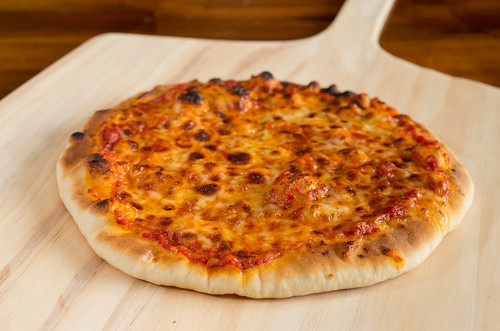
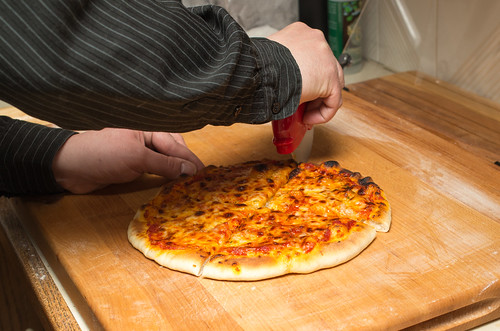
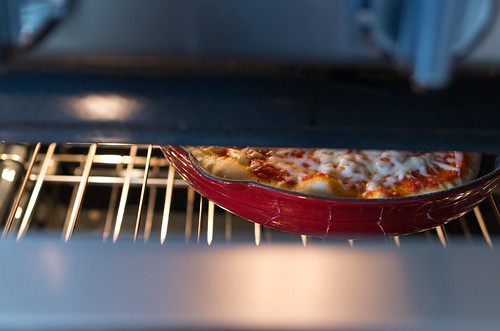
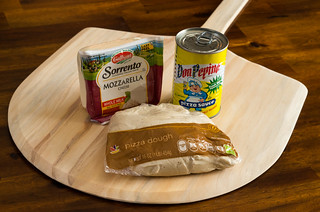
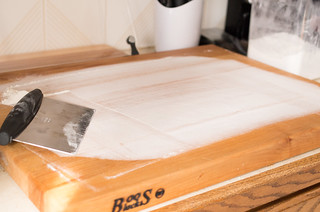
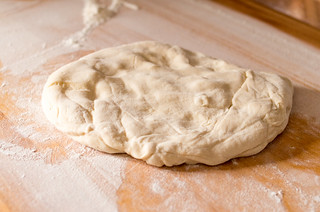
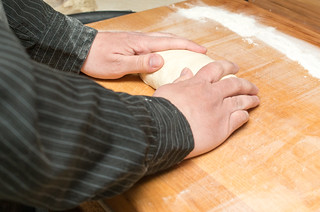
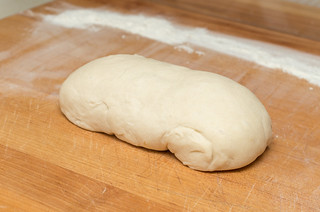
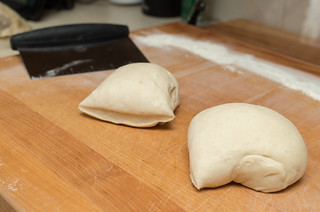
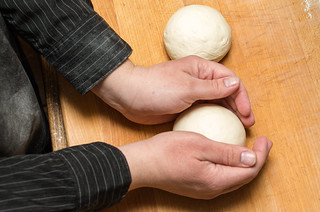
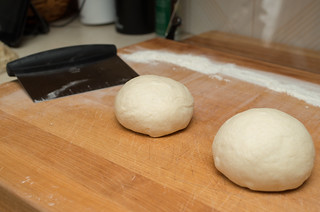
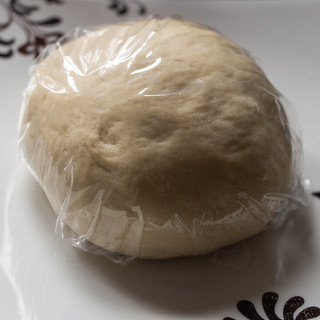
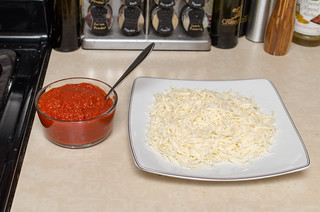
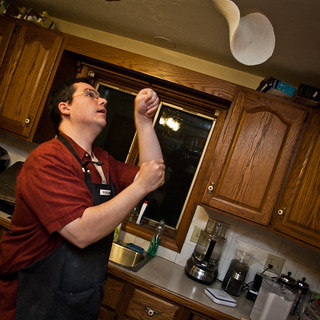

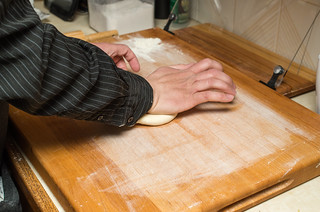
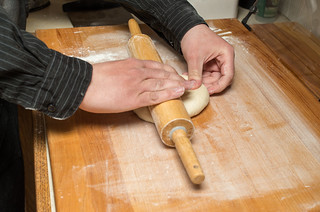
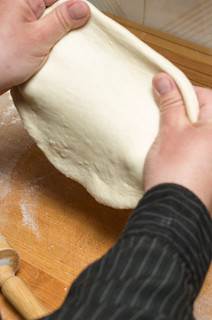
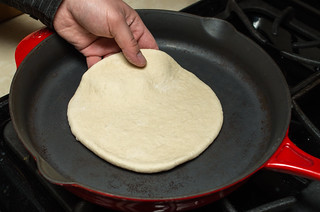
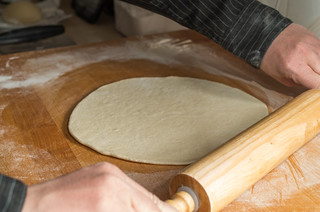
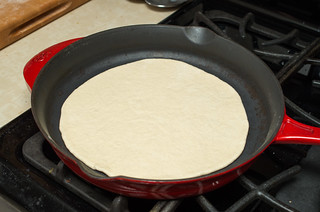
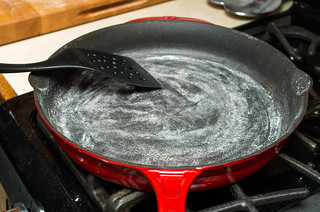
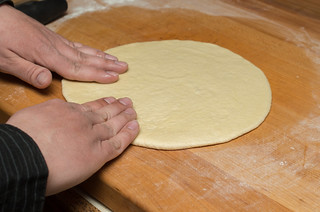
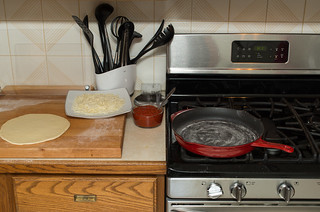
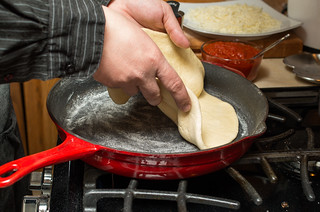
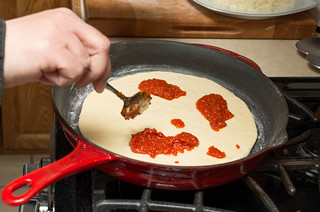
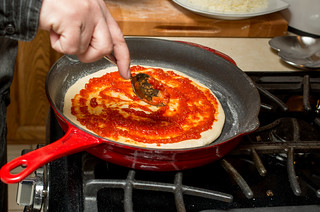
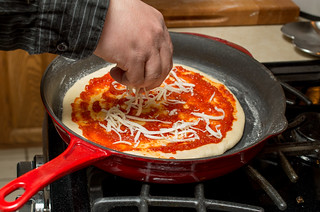
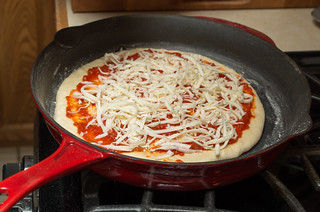
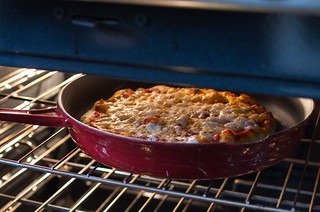
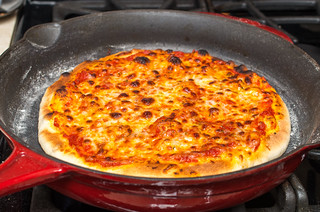

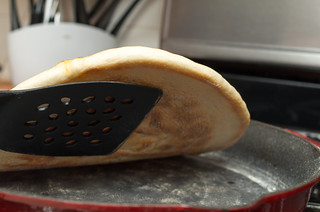
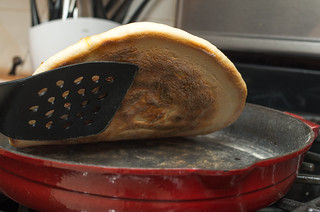
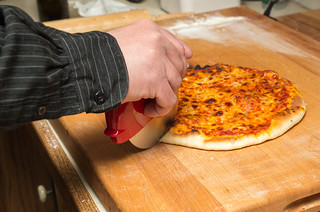
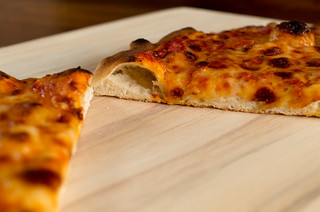
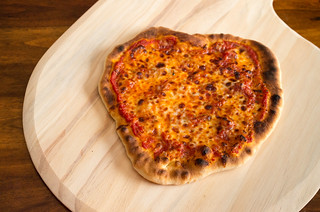
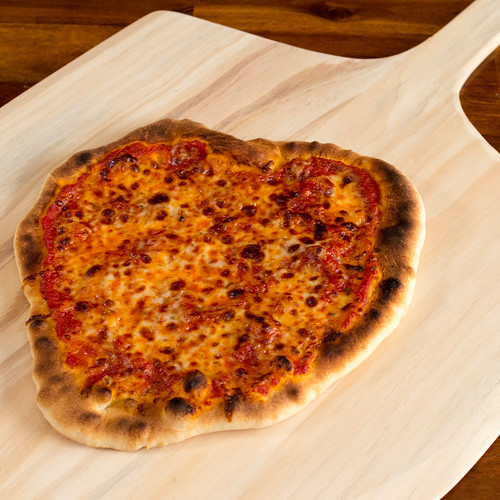
I am afraid of heights and get scared when you throw me.
ReplyDeleteHi thanks for posting thiss
ReplyDelete